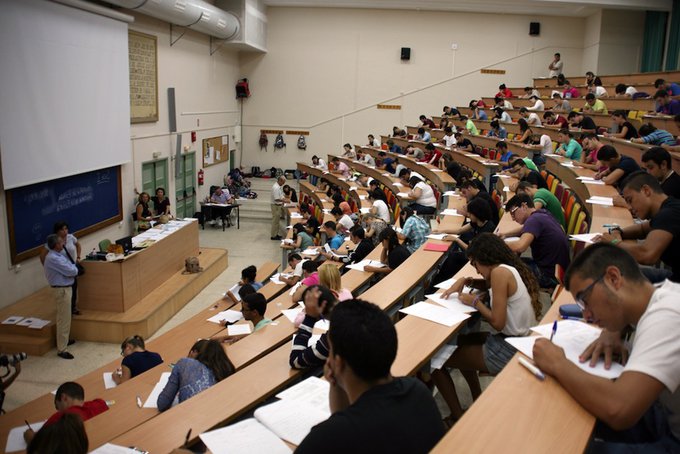
Spain is one of the leading destinations among foreign students for higher education abroad, because the quality of education meets the highest standards, and the cost is much lower than in England, America or Canada. Every year, about 70 thousand foreigners come to hospitable Spain to get a higher education.
Advantages of Universities in Spain
-
Prices. Studying and living in Spain will be much cheaper than in other EU countries, not to mention the US and the UK. The cost of studying at a state university for a foreign student starts from 700 euro per year. Renting a room in a student apartment will cost about 230 euro per month. Students are given discounts in museums, cafes and transport.
-
Bilingual education. Most of the country's prestigious universities offer courses in both Spanish and English. Some subjects are chosen by the students themselves, so by the time they graduate, they have the opportunity to master the skills in their specialty in two very common languages in the world. For international students, each university also has Spanish language courses.
Disadvantages and characteristics of Spanish universities
-
The level of prestige in Europe and the world. Spanish universities are constantly evolving. But they are still far from the Anglo-Saxon universities, which lead all the world rankings. Spanish universities among students are a frequent choice for an exchange semester, but not an investment in a prestigious education. Although some universities with English programs or a double degree still rank high in the QS, THE and CWUR rankings.
-
Autonomy of universities. Spain has a rather complex administrative structure. Conflicts often occur between regions. Some universities are under the control of autonomous communities such as Catalonia and Valencia. Their requirements may differ from those of the rest of Spain, and instruction is usually conducted in the local language or dialect. Students may have difficulty finding employment or moving to another university.
-
Political. In Spain, universities are not always out of politics. Many universities openly declare their political affiliation. This does not always have a good effect on the reputation of students and teachers in the scientific community and in society at large.
-
The need to legalize the diploma. To enter a Spanish university, citizens of other countries often need to legalize and / or homologate a prior education document (certificate or diploma), if they were obtained in their home country. This is a long and complicated procedure. You can read more about it in the article Education in Spain.
Higher education in Spain has three cycles. Each of the cycles ends with the passing of exams and the assignment of the corresponding degree. According to Spanish law, only universities can provide higher education, and in this sense Spain is listed as a conservative country.
Spanish universities fall into three categories:
-
State (forty-three universities)
-
Private (three universities)
-
mixed
State universities in Spain
The vast majority of students in Spain study at public universities. For example, in the academic year 2019/2020, the percentage of students in public and private universities was from 86% to 14%. At the same time, the quality of education in public universities, according to annual rankings, is higher than in private universities.
Main characteristics of public universities in Spain:
-
have a long history;
-
it is more difficult to enter than private ones, since competition for a bachelor's degree, for example, is conditioned by a cut-off note, which depends, among other things, on entrance tests;
-
funded by the state, therefore, the tuition fee is lower than in private universities;
-
offer tuition discounts for certain categories of students: from low-income / large / single-parent families; with developmental characteristics; from families of victims of violence or terrorism; refugees, etc.;
-
allow all your students to apply for a college scholarship, which may cover the cost of actual tuition, the cost of housing / teaching materials, or the college-to-home journey;
-
offer more areas of study than private universities, including basic sciences;
-
have more research resources than private universities;
-
give your students more independence and less control;
-
some companies prefer to hire graduates from public universities;
-
in most national rankings, public universities are recognized as the best.
Private universities in Spain
Main characteristics of private universities in Spain:
-
most of them have been created in the last 20 years;
-
it is easier to enrol as not all private universities require entrance examinations. In such cases, applicants are admitted on the basis of an interview and academic and / or professional background and the presence of certain knowledge / skills (e.g. knowledge of a foreign language);
-
they are not funded by the state, therefore the tuition fee is much higher than at state universities;
-
the scholarships of the Ministry of Education for students of private study centers are different from those awarded to students of public universities;
-
teachers are more motivated, since in case of ineffective work, a private university can dismiss them, while a state university can not;
-
fewer students allow a personal approach to all;
-
the personal control of each student can increase their productivity, but reduce autonomy;
-
have more resources to update classrooms, teaching materials, etc.;
-
they do not have sufficient resources to carry out research and are focused on education and subsequent employment;
-
the main areas of study are humanities and socio-legal sciences, economics and management;
-
have more contacts with private companies and therefore offer your students more internships and potential jobs.
